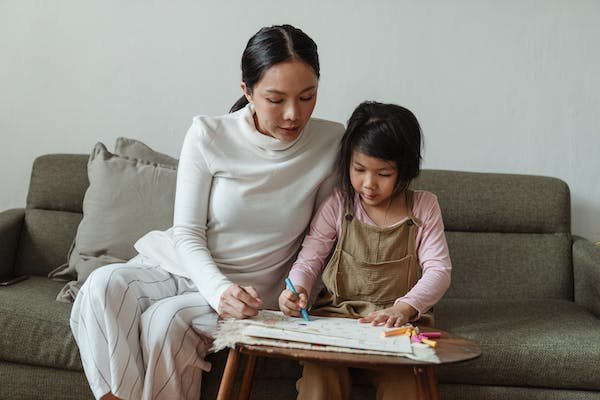New Year’s Resolutions: Parenting Edition
We have all had those parenting moments where we think, “Tomorrow I will do better”, or “After we get through this week, it will be easier.” As we parent, we are constantly adjusting and adapting to our growing, evolving children. We do not start off knowing how to do everything just right. That is something we learn as we go along. Because of this, many of us make mistakes, say the wrong things, and feel confused about what is the right decision. The feeling that we may not be parenting our children in the best way possible leads to guilt for many parents – both new and experienced. You may promise yourself or your children that you will be more patient, more involved, or more present – only to find that you cannot make it stick. Here, we present parenting resolutions for the new year that are easy to implement and are sustainable. Happy New Year and Happy Parenting!
You can choose any number of the suggestions below.
Table of Contents:
Being More Present
One of the easiest ways to do this is to simply put aside your phone while you are in the company of your children. Do it even if their noses are buried in their phones! When you are fully present and aware, you will become more aware of and attuned to your children. They will notice that you are undistracted and will be open to engaging with you on a deeper level. Often, when our kids see that we are busy or distracted, they will make attempts to connect. Parents may find these attempts irritating or intrusive. But if you are fully present, you will be more welcoming of any overtures your child makes towards you and therefore you will be better able to connect with them.
Show Interest
If getting into the present is challenging for you, try this. When your child comes to show you something, ask a question, or share a story, give them your full attention. Put your phone away, turn down the television, put aside what you are doing and listen. With time, this will become easier for you.
Enjoy Their Company
Another way to be more present with your children is to commit fully to the conversation you are having with them or the activity you are doing with them. If you are distracted or doing something else at the same time, you will not be able to connect with your child. But when your energies are focused, you will find that enjoyment and engagement become easier. Also, do not just tell your kids that you enjoy being with them, let them see that you are genuinely enjoying yourself. Laugh freely, smile at them, and use your body language to communicate your interest and enthusiasm.
Remember What Your Children Tell You
What children really need from their parents is acceptance, validation, and approval. They need to feel that they are being heard. We often mention the skill of active listening in our blogs. Active listening is:
giving the speaker your full attention
using body language and facial expressions to convey interest
repeating what has been said in your own words to ensure you understand
acknowledging and validating the speaker’s emotions
not interrupting, judging, or offering solutions (unless asked)
allowing for silence
When you listen to your child in this way, they will feel heard, validated, and respected. Additionally, by listening in this way, you will remember what your child has talked to you about.
Avoid Over-reacting
How often has your child asked you to stop over-reacting? If you have not heard this, you are doing something right! Temper your responses to their mistakes, or mistakes that you see are about to happen – like a spilled cup of milk or dirt tracked through the house. Remember to focus more on the person and less on the thing. So, keep the focus on your child versus your freshly mopped floors.
Avoid a Battle of Wills
When interacting with your child, remember, your goal is not to win or prove them wrong. Your goal is to cultivate healthy communication and an exchange of ideas and thoughts. Be open to hearing out solutions your child presents to a problem. Take some time to hear the feeling behind what they are saying. Hear them out, you do not always have to be right. Make a conscious effort to listen actively to your children's thoughts, concerns, and feelings. Encourage conversation that goes below the surface, and avoid being judgmental or dismissive.
Too often parents think that their children must offer them automatic respect. While a respectful parent-child relationship is the goal, demanding respect instead of earning it from a child ignores their humanness. Your child is their own person - with feelings, perceptions, and thoughts separate from your own. When we respect this in our children, they in turn will respect us.
Acknowledge and Apologize
As a parent, you may get caught up in the busyness of life and be dismissive of your child, raise your voice, or deal with an issue unfairly. This is okay, as in our mistakes we find our greatest learnings. But it is important that you acknowledge your own behavior to your child. It is also important that you then apologize to them. For example, “I’m sorry I spoke to you that way. I will try to speak more politely next time.” By doing this, you are not undermining yourself to your children. Rather, you are showing them that you made a mistake, owned it, and communicated how you will try to avoid making the same mistake again. You are modeling accountability and emotional regulation for your children. Doing this will also inculcate in children an awareness for how their words and actions can make others feel.
Connect with Other Parents
You can join online forums, support groups, or community groups in order to build relationships with other parents. Get to know the parents in your kids’ school and the parents of their friends. You can also exchange parenting stories with other parents within your own family and friend groups. Sharing your thoughts and experiences with other parents can often bring perspective to your own parenting. It can also give you ideas and strategies for coping with hiccups you may be having.
Be Flexible
Being flexible in your parenting opens up options and gives you ‘outs’. It also shows your children that you are willing to consider other ways of doing things. By listening to other points of view and considering alternative methods, you are modeling ways of dealing with challenges and the unexpected. Flexibility can also reduce the stress of a tense family moment and clear the way for healthy interaction.
Quality Time
This is often over-looked due to its overuse as a catch-phrase. However, when you really think about it, what is quality time? Or rather, what does quality time with your children look like to you and them? Ask your child how they would most like to spend time with you. It does not have to be an elaborate day out. You may be surprised at the simple things that make kids happy. For example, you can have a chat over a cup of hot chocolate. You can have a fulfilling conversation in the car on the way to drop them off for a practice. You can watch an episode of a show you all enjoy. You can sit with them while they study. The essential component to quality time is that you are fully present – physically, emotionally, and mentally.
Keep in mind that finding ways to spend time with your children may work better if it is child-led. This means that if they are reluctant to join an activity that you ask them to, consider joining them in what they are doing. For example, if your child is drawing, ask them if you can join them and draw as well. If they are making themselves a snack, sit in the kitchen with them as they do so.
Modeling
Reflect on a few values or behaviors you would like your children to improve on. For example, empathy, responding with kindness, or gratitude. Instead of lecturing your children and telling them how to be more empathetic, kinder, or grateful, fully commit yourself to modeling these behaviors for them. Make sure you do this in a genuine, relatable, and sustainable way.
Look After Yourself
Ensure that you get enough time to socialize and spend time with friends and family. Find opportunities to do things that are good for you, like pursuing a hobby, exercising, being out in nature, and having some time for yourself. A healthy, happy you will make for healthier, smoother parenting.
If you are struggling to maintain or nurture a connection with your child, consider relationship counseling. Relationship counseling is not only for couples. It can help with a variety of relationships, including the parent-child dynamic. Trust Mental Health has a team of therapists that offer therapy for children, relationship counseling, and couples therapy in California. We offer sessions both in person and online. Our team speaks over 15 different languages. We understand the nuances that intersectionality brings into mental health issues. Therefore, we provide care that acknowledges the cultural sensitivities and varied backgrounds of our clients. Contact us today for a free 15 minute consultation. We will match you with a therapist that best suits your needs.
FAQs
-
Relationship counseling is not just for those going through a divorce or a rough time. This type of therapy is not limited to romantic relationships. Relationship counseling can help when interpersonal issues start interfering with your daily life and mental health. Whether it is for couples, siblings, families, friends, or even business partners, Trust Mental Health is here for you.
-
It can help when you need extra support and guidance in identifying and resolving challenges in your relationships. The help you receive through relationship counseling will give you the tools you need to engage genuinely with others. It can help you understand the dynamics within your relationships and provide you with strategies to heal and make adjustments.
-
At Trust Mental Health, couples therapy and family counseling come under our umbrella of relationship counseling. Our therapists are experienced in both couples therapy and family counseling and provide therapeutic services for a variety of interpersonal dynamics and relationships. With us, you will learn tools that will allow you to build, nurture, and maintain functional relationships.
-
Trust Mental Health’s diverse team of BIPOC therapists has experience in techniques such as the Gottman Method. We use these tools to help you increase relationship satisfaction and navigate difficult conversations. In couples therapy, we help you build a foundation of mutual love, respect, and trust.





